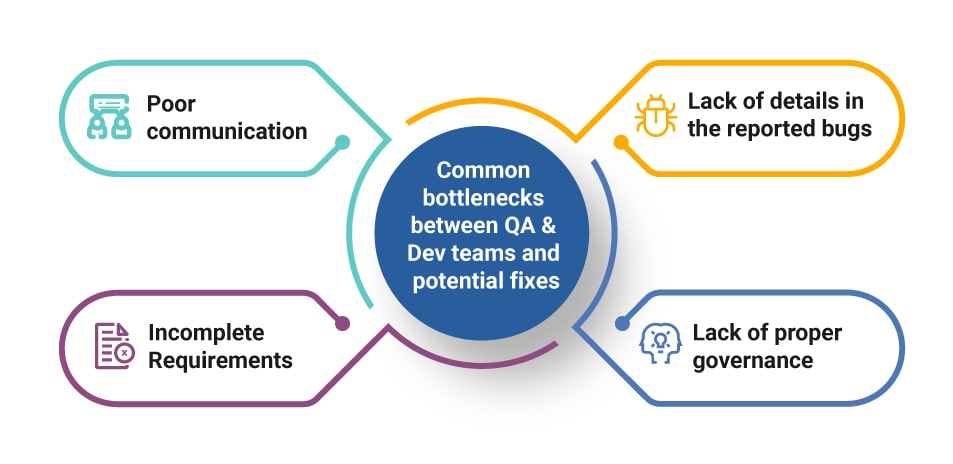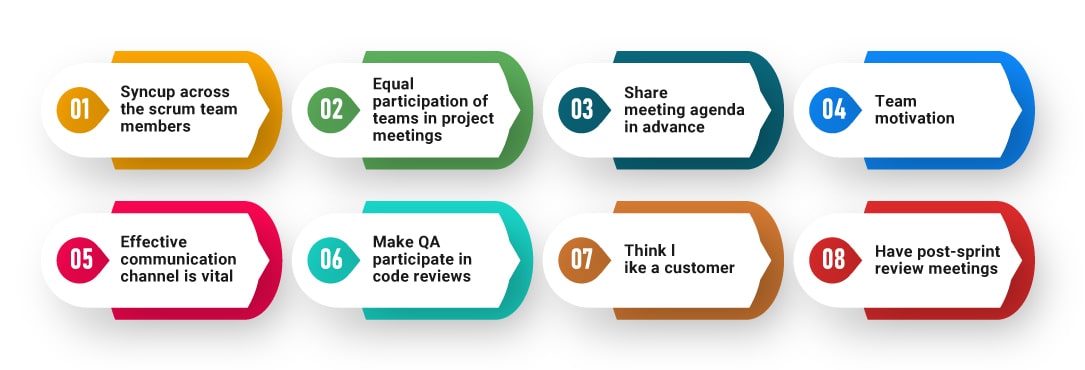Recommended Blogs
How to Ensure QA & Dev Team Collaboration for Achieving Improved Quality?

Table of Contents
- Make your QA and Dev teams work together
- Common bottlenecks between QA & Dev teams and potential fixes
- Ways to set up a culture of collaboration between QA and Dev teams
- How does seamless collaboration between QA & Dev teams ensure improved quality?
- Conclusion
- How can TestingXperts help?
Make your QA and Dev teams work together
Today, businesses embrace DevOps processes to streamline deployments, achieve faster releases, and ensure quicker time-to-market. The Development (Dev) and Operations (Ops) teams work collaboratively to enable faster and more continuous releases in a DevOps environment. It is seen that Dev and the Quality Assurance (QA) teams play an essential role wherein Dev teams strive to deliver code on time, while the QA engineers test the software to maintain higher quality. A lot goes on behind the scenes wherein all the teams collaborate towards a common goal of releasing a top-notch product into the market.
It is to be stated that with agile and DevOps adoptions are on the high by businesses, seamless coordination between teams should exist to ensure faster releases and reduced time to market. But, in reality, some pain points or bottlenecks typically affect this symbiotic relationship between the Dev and QA teams.
Common bottlenecks between QA & Dev teams and potential fixes

1. Poor communication:
It is known that successful product releases rely on back-and-forth communication among all the associated departments of QA, Dev, and Ops. It is important to share the project updates and requirements with the teams, including working closely with the designers, managing inputs and feedback across teams, and explaining test reports to developers. Without solid communication and effective collaboration between all teams involved, project delivery and schedule often take a hit.
QA and Dev teams should collaborate and communicate regularly through instant messaging apps, checkpoint meetings and other collaboration tools like Jira, Confluence etc. Both teams should be aware of priorities of each other and plan their activities accordingly.
2. Incomplete Requirements:
Documentation plays a significant role in the success of a project. Both the Dev and the QA teams must have first-hand information or the requirement specifications so that teams are well aware of the project requirements and can quickly jumpstart the project.
Lack of proper understanding of the end-user requirements or expectations can lead to QA testing challenges and unexpected project outcomes and collaboration issues. Both the teams should discuss the requirements and acceptance criteria and form a common understanding of same. Both QAs and Devs should actively participate in grooming sessions, and sprint planning sessions to get proper clarity on these requirements and identify any gaps in the acceptance criteria.
3. Lack of proper governance:
Many organizations see a lack of thought leadership to draw a master plan for effective DevOps implementation. But, the thought leadership needs to take the right step toward the DevOps adoption and maintain a proper balance between the QA and Dev teams. Adoption of DevOps practices may require a lot of effort on R & D initiatives and a clear vision. All the required skillset for implementation of DevOps practices may not be available in-house. In such case, the services of an external vendor with proven experience in implementing such practices should be availed.
4. Lack of details in the reported bugs:
Finding a bug by the QA team and simultaneously reporting the bug correctly in the defect management tool in an understanding format is essential. QA teams should provide relevant screenshots, video artifacts, logs, etc., to showcase the bugs registered to ensure quicker resolution of defects by Dev teams.
Thus, analyzing the above bottlenecks, it becomes essential for enterprises and organizations, irrespective of their size, to consider the below ways to ensure a seamless culture of collaboration between various teams (QA, Dev, Ops) and departments.
Ways to set up a culture of collaboration between QA and Dev teams

Well-defined communication helps ensure the project requirements are well understood between the teams, resulting in faster project delivery. But how is it possible? How can Dev effectively collaborate with QA and vice versa? The nine tips below will help DevOps teams ensure seamless collaboration between them and help to increase their overall productivity to deliver high-quality results to stakeholders.
1. Syncup across the scrum team members:
All teams should attend daily stand-ups to understand the actionable items to be worked on. These short meetings enable the Dev teams to share their future roadblocks/dependencies and facilitate coordination. Similarly, stand-up meetings allow the QA engineers to showcase their successful task status, highlight the critical bottlenecks within the QA process, and discuss ways to eliminate these. Managers can even go further by having weekly or monthly team meetings. These meetings may celebrate the achievements and team progress, appreciate the star performers, and realign the resources if required.
2. Equal participation of teams in project meetings:
Time is critical during the project progress and may be wasted when teams involved do not have the proper information. Both Dev and QA teams should proactively participate in project meetings and share essential data, recommendations, and requirements. This way, the overall project accelerates, preventing high frustration and low productivity incidents at later stages.
3. Share meeting agenda in advance:
It is essential to share the meeting agenda ahead with various teams such that the teams are well-prepared for any reports or data required for the meeting. This advance notice lets the Dev team share their high-level updates with the QA team while the QA team can add the relevant QA-based meeting topics for the Dev team. After the meeting, the Dev and QA teams may consider sharing the meeting notes or action items to motivate teams to collaborate and promote seamless team collaboration.
4. Team motivation:
Scrum masters may have individual conversations with the QA and Dev teams to ensure that the teams stay motivated and work together in harmony. Weekly, monthly, and quarterly meetings may be organized wherein the Dev and QA teams can discuss project goals and what they want to achieve next.
5. Effective communication channel is vital:
The lack of understanding between the QA and Dev departments can ultimately hamper the final product. An effective communication channel is critical for teams to voice their concerns and share recommendations to collaborate better. When working in an agile environment, engineers interact and learn from one another. This includes working together during the sprint cycles and scrum meetings. One more noteworthy DevOps practice is to ensure both verticals know the priorities and action items to reduce any dependencies. It can be done by utilizing some project management tracking tools.
6. Make QA participate in code reviews:
In many organizations, code-reviewing is done with minimal to no involvement of QA engineers. However, that should not be the case. The QA engineers should take part in code reviews to develop appropriate test cases based on different use cases. Thus, understanding of the codebase should not be left only to the developers, and the QA teams should also be involved.
7. Think like a customer:
When QA and Dev teams work on a project, they should understand the scope of customer expectations from the product. The fact is that advancements in technology have raised customer expectations of any product or service. Product companies adopt the customer-centric approach to meet or surpass customer satisfaction and deliver high-quality products to enable a great customer experience.
8. Have post-sprint review meetings:
The post-sprint review is an easy step that’s even easier to overlook. It is required to have a short meeting with the QA and Dev teams to discuss their development process experience. Teams can discuss what worked well, enhancements’ scope, gaps or miscommunications, etc. When everyone is pushing hard towards meeting strict deadlines, it may not be possible to make changes in the existing processes, no matter how beneficial they are. Post-sprint reviews are the best place for QA and Dev teams to identify what strategies need a retrospection and make the necessary arrangements moving forward.
How does seamless collaboration between QA & Dev teams ensure improved quality?
Effective collaboration can shape how QA and Dev teams deliver quality results in a DevOps environment. It requires all the engineering teams — Dev, QA, IT, and others — to come together and create high-quality products. When the collaboration goals are met, QA teams can perform continuous testing (CT) and push regular test results and feedback into the continuous integration(CI) system. As a result, faster feedback loops are created, facilitating continuous delivery (CD) and quicker time-to-market.
Thus, a strong collaboration between Dev and QA teams ensures effective CI, CT, and CD and enables faster and quality releases due to the quick feedback loop between teams and product owners. Therefore, strong collaboration between departments ensures everyone is responsible for the product quality and its timely releases. Thus, seamless team collaboration makes the development and testing processes go hand-in-hand, ensuring superior quality products for a great customer experience (CX).
Conclusion
With businesses embracing DevOps, it becomes essential to have a seamless collaboration between Dev, Ops, and QA teams. When we speak of agile methodologies and DevOps-driven business models, it is evident that the QA and Dev teams must work in sync toward making the product as flawless as possible. QA and Dev teams may be different but are entirely interdependent.
The Dev team’s role should not be limited to developing a product but a product that has achieved the maximum possible quality. Similarly, for the QA team, their job is not just about testing the product but prioritizing the QA tasks so that the Dev teams can fix errors in time and deliver a quality product. Therefore, it becomes necessary that all teams strive for a common goal of achieving unmatched product quality and not just fulfilling their tasks. Further, this seamless collaboration will help deliver a high-quality product for enabling a seamless CX.
How can TestingXperts help?
TestingXperts’ reliable team of quality assurance and software testing engineers is experienced with the latest testing tools, trends, and methodologies. Leverage next-gen testing services from us with customized and client-centric engagement models to achieve high-quality and cost-effective solutions.
Discover more
